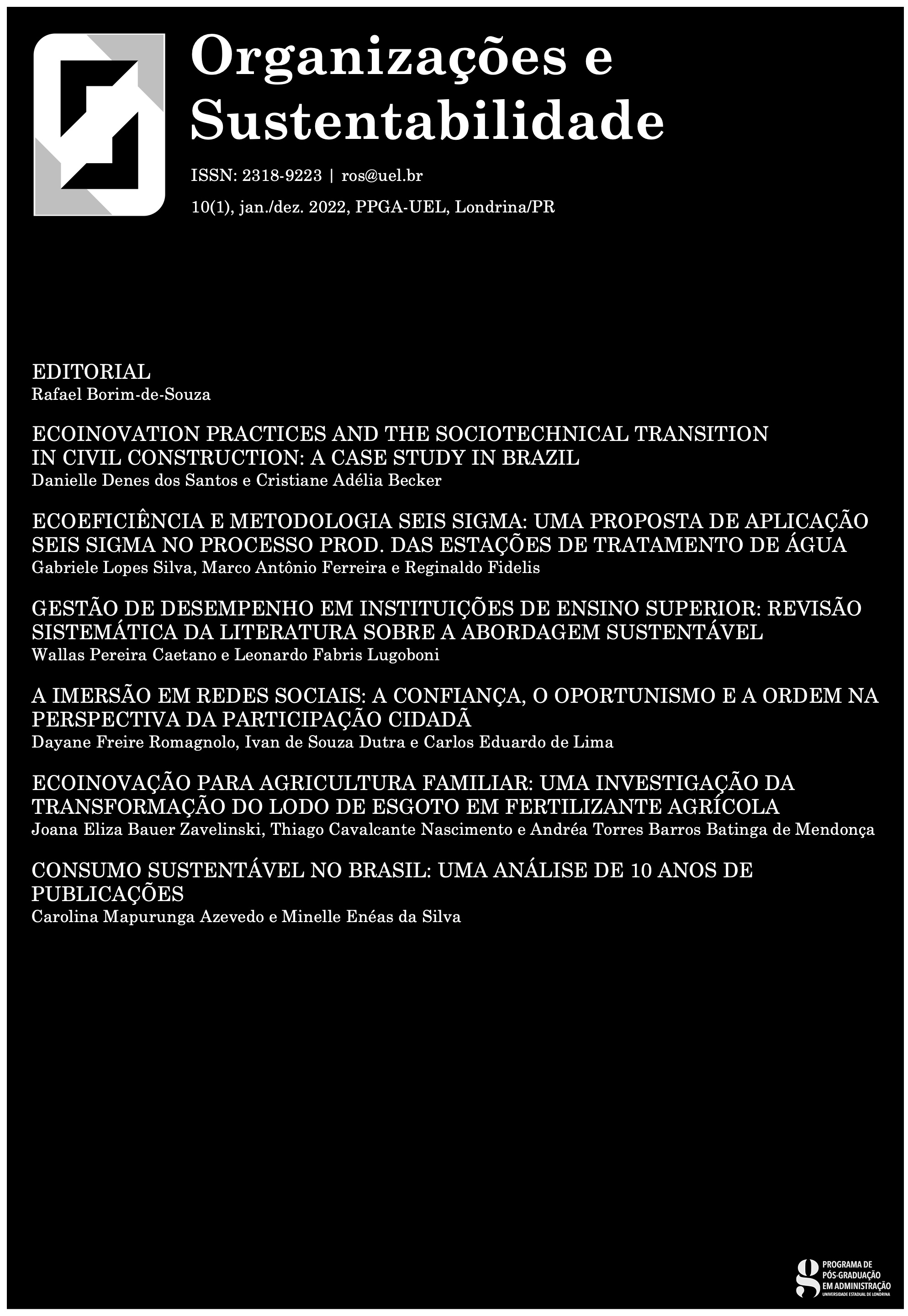PERFORMANCE MANAGEMENT IN HIGHER EDUCATION INSTITUTIONS
A SYSTEMATIC LITERATURE REVIEW ON THE SUSTAINABLE APPROACH
DOI:
https://doi.org/10.5433/2318-9223.2022v10n1p38-54Keywords:
Performance Indicators, Higher Education Institutions, SustainabilityAbstract
This research sought to categorize the literature on performance in higher education institutions in relation to the sustainable approach related to the Sustainable Development Goals (SDGs). A theoretical study was carried out, with an exploratory and qualitative approach, based on a systematic review of the literature using Prisma-P as a protocol for analysis of papers. The articles addressed indicators related to the following topics: Materials, Energy consumption and generation, Water consumption, Biodiversity, Emissions, Effluents and waste, Environmental assessment of suppliers, Social employment, Health and safety at work and Social training and Education, which are of paramount importance for higher education institutions to monitor the environmental impact of their activities and products. It was possible to identify in the articles that SDGs 3, 4, 5, 6, 7, 8, 9, 11, 12, 13, 14, 15 and 17 were addressed by at least one of the articles. The main contribution of this research is the organization of the literature relating 3 very relevant topics: Performance management, management of educational institutions and the UN SDGs.
Downloads
References
Alonso, K. R., Morales, G. B. C., & López, J. G. (2015). Indicadores para el control estratégico en la Universidad de Cienfuegos. Revista Universidad y Sociedad, 7(3), 56-62.
Annan-Diab, F., & Molinari, C (2017). Interdisciplinarity: Practical approach to advancing for sustainability and for the sustainable development goals. The International Journal of Management Education, 15(2), 73-83.
Atkinson, G. (2000). Measuring corporate sustainability. Journal of Environmental Planning and Management, 43(2), 235-252.
Bansal, P., & Roth, K. (2000). Why Companies Go Green: a model of ecological responsiveness. Academy of Management Journal, 43(4), 717 -736.
Beloff, B., Tanzil, D., & Lines, M. (2004). Sustainable development performance assessment. Environmental Process, 23(4), 271-276.
Bondy, K., Matten, D., & Moon, J. (2008). Multinational corporation codes of conduct: Governance tools for corporate social responsibility. Corporate Governance, 16(4), 294-311.
Bourne, M., Neely, A., Mills, J., & Platts, K. (2003). Implementing performance measurement systems: a literature review. International Journal of Business Performance Management, 5(1), 1-24.
Brown, H. S., Jong, M., & Lessidrenska, T. (2009). The rise of the Global Reporting Initiative: a case of institutional entrepreneurship. Environmental Politics, 18(2), 182-200.
Campbell, J. L. (2007). Why would corporations behave in socially responsible ways? an institutional theory of corporate social responsibility. Academy of Management Review, 32(3), 946-967.
Casani, F., & Pérez-Esparrell, C. (2009): Social responsibility in Spanish public universities: vectors of change in governance. Economics Research of the Education, 4, 127-137.
Castka, P., & Balzarova, M. (2008). Social responsibility standardization: Guidance or reinforcement through certification. Human Systems Management, 27, 231-242.
Chen, S. H., Wang, H. H., Yang, K. J. (2009). Establishment and application of performance measure indicators for universities. The TQM Journal, 21(3). 220 -235.
Fischer, D., Jenssen, S., & Tappeser, V. (2015). Getting an empirical hold of the sustainable university: a comparative analysis of evaluation frameworks across 12 contemporary sustainability assessment tools. Assessment and Evaluation of Higher Education, 40(6), 785-800.
García-Feijoo, M., Eizaguirre, A., & Rica-Aspiunza, A. (2020). Systematic review of sustainable-development-goal deployment in business schools. Sustainability, 12(1), 440.
Guerra, M. F., Brito, A. C., & Soares, J. L. (2017). Avaliação de desempenho das instituições de ensino superior brasileiras: Uma reflexão à luz da Controladoria. Revista Espacios, 38(15), 11.
Haertle, J., Parkes, C., Murray, A., & Hayes, R. (2017). PRME: Building a global movement on responsible management education. The International Journal of Management Education, 15(2), 66-72.
Jimenez C. G, Martinez, A. G., & Lopez, M. A. (2016). Proposal for University Social Responsibility indicators according to GRI G4 guidelines: The case of the University of Cordoba (Spain). Revista de Economia Publica Social y Cooperativa, 87, 103-137.
Kraemer, M. E. P. (2004). The 21st Century University Towards Sustainable Development. Electronic Journal of Administrative Science, 3(2), 1.
Li, Y., Gu, Y., & Liu, C. (2018). Prioritizing performance indicators for sustainable construction and development of university campuses using an integrated assessment approach. Journal of Cleaner Production, 202, 959-968.
Moher, D., Shamseer, L., Clarke, M., Ghersi, D., Liberati, A., Petticrew, M. & Stewart, L. A. (2015). Preferred reporting items for systematic review and meta-analysis protocols (Prisma-P) 2015 statement. Systematic reviews, 4(1), 1-9.
Nitkin, D., & Brooks, L. J. (1998). Sustainability auditing and reporting: The Canadian experience. Journal of Business Ethics, 17, 1499-1507.
Organização das Nações Unidas (2021). Objetivos de Desenvolvimento Sustentável. https://brasil.un.org/pt-br/sdgs.
Palasai, P., Sirisoponsilp, S., & Chandrachai, A. (2017). Performance Management Model: A Study in Thai Public Higher Education Institutions. International Journal of Economics & Management, 11(S1), 59-73.
PRME Chapter Brazil (2021). PRME - Chapter Brazil. http://prmebrazil.com.br/.
Salzmann, O., Ionescu-Somers, A., & Steger, U. (2005). The business case for sustainability: Literature review and research options. European Management Journal, 23(1), 27-36.
Schwarz, J., Beloff, B., & Beaver, E. (2002). Use sustainability metrics to guide decision-making. Chemical Engineering Progress, 98(7), 58-63.
Searcy, C. (2012). Corporate Sustainability Performance Measurement Systems: A Review and Research Agenda. Journal of Business Ethics, 107, 239-253.
Szekely, F., & Knirsch, M. (2005). Responsible leadership and corporate social responsibility: Metrics for sustainable performance. European Management Journal, 23(6), 628-647.
Tanzil, D., & Beloff, B. (2006). Assessing impacts: Overview on sustainability indicators and metrics. Environmental Quality Management, 15(4), 41-56.
Taticchi, P., Garengo, P., Nudurupati S. S., Tonelli, F., & Pasqualino, R. (2015). A review of decision-support tools and performance measurement and sustainable supply chain management. International Journal of Production Research, 53(21), 6473-6494.
Taticchi, P., Tonelli, F. and Cagnazzo, L. (2010). Performance measurement and management: a literature review and a research agenda. Measuring Business Excellence, 14(1), 4-18.
Vallaeys, F. (2008). University social responsibility: a new philosophy of ethical and smart for universities. Higher Education and Society, 2, 191-220.
Weber, M. (2008). The business case for corporate social responsibility: A company-level measurement approach for CSR. European Management Journal, 26, 247-261.
Yaakub, M. H., & Mohamed, Z. A. (2020). Measuring the performance of private higher education institutions in Malaysia. Journal of Applied Research in Higher Education, 12(3), 425-443.
Zamora-Polo, F., & Sánchez-Martín, J. (2019). Teaching for a Better World. Sustainability and Sustainable Development Goals in the Construction of a Change-Maker University. Sustainability, 11(15), 4224.
Downloads
Published
How to Cite
Issue
Section
License
Copyright (c) 2022 Organizações e Sustentabilidade

This work is licensed under a Creative Commons Attribution-NonCommercial-NoDerivatives 4.0 International License.
O(s)/a(s) autor(es)/autora(s) transfere(m) todos os direitos autorais do artigo para a revista Organizações e Sustentabilidade, sendo vedada qualquer reprodução, total ou parcial, em qualquer meio de divulgação, impresso ou eletrônico, sem que a prévia e necessária autorização seja solicitada e, se obtida, fará constar o competente registro e agradecimento à revista.












